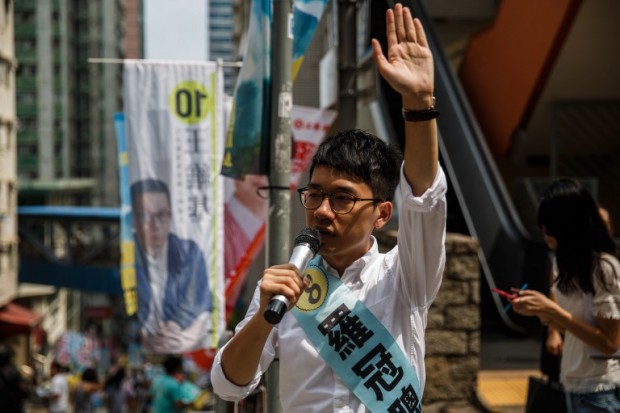
Nathan Law, 23, a leader of the 2014 pro-democracy rallies, campaigns for his political party Demosisto party during the Legislative Council election in Hong Kong on September 4, 2016. Law and at least two other young Hong Kong activists calling for a complete break from China looked set to win in the major elections. AFP
HONG KONG, China — A new generation of young Hong Kong politicians advocating a break from Beijing looked set to become lawmakers for the first time Monday in the biggest poll since mass pro-democracy rallies in 2014.
A record 2.2 million people voted in the city-wide legislative election which ended in the early hours of Monday and saw activists who support Hong Kong’s independence from China standing for the first time.
It comes as fears grow that Beijing is tightening its grip on the semi-autonomous city in a range of areas, from politics to education and media.
READ: Divided Hong Kong goes to polls as Beijing watches | Record voter turnout in key Hong Kong election
In a landmark victory, at least three of a handful of young campaigners calling for much more distance from Beijing were forecast to win seats with 90 percent of the vote counted.
Among them is Nathan Law, 23, leader of the 2014 “Umbrella Movement” rallies, who is guaranteed a seat after coming second in his constituency behind a pro-Beijing candidate.
Law and his new party Demosisto are calling for a referendum on independence, emphasizing Hong Kongers’ right to choose.
“I think Hong Kongers really wanted change,” Law said, celebrating his win.
“Young people have a sense of urgency when it comes to the future.”
Law will now take up a seat in the Legislative Council (LegCo), Hong Kong’s lawmaking body.
Most established pro-democracy politicians do not support the notion of independence and there were concerns in the democratic camp that new activists would split the vote, triggering overall losses.
If the democrats lose four seats, they will forfeit the one-third voting bloc they need to veto bills, stacking the already skewed legislature even more in favor of Beijing.
However, early results showed the democrats are likely to hold on to that veto power.
Beijing bias
It is as good a result as the democrats could hope for, given that the framework of LegCo favors Beijing.
The structure of the council makes it almost impossible for the democracy camp to take a majority as 30 of the council’s 70 seats are elected by special interest groups representing a range of businesses and social sectors. Those seats go predominantly to pro-Beijing candidates.
Fears that Hong Kong’s freedoms are disappearing were fanned after five city booksellers known for salacious titles about Beijing politicians disappeared, resurfacing in detention on the mainland.
That fueled the fire of the “localist” movement, which grew out of the failure of the 2014 rallies to win political reform pushing for more distance from Beijing.
It saw the emergence of young campaigners demanding outright independence for Hong Kong — a subject previously taboo.
Hong Kong was handed back to China by Britain in 1997 under a “one country, two systems” agreement intended to protect its freedoms and partial autonomy for 50 years. However, many young campaigners believe that deal has failed.
Pro-democracy campaigners with megaphones urged voters to get to the polls Sunday to prevent the LegCo swinging further towards Beijing.
At some polling stations there were snaking queues until 2:30 am (1830 Sunday GMT) — four hours later than the scheduled cut-off time — with a turnout of almost 60 percent of 3.7 million voters.
That compares with 53 percent in the last LegCo elections in 2012./rga